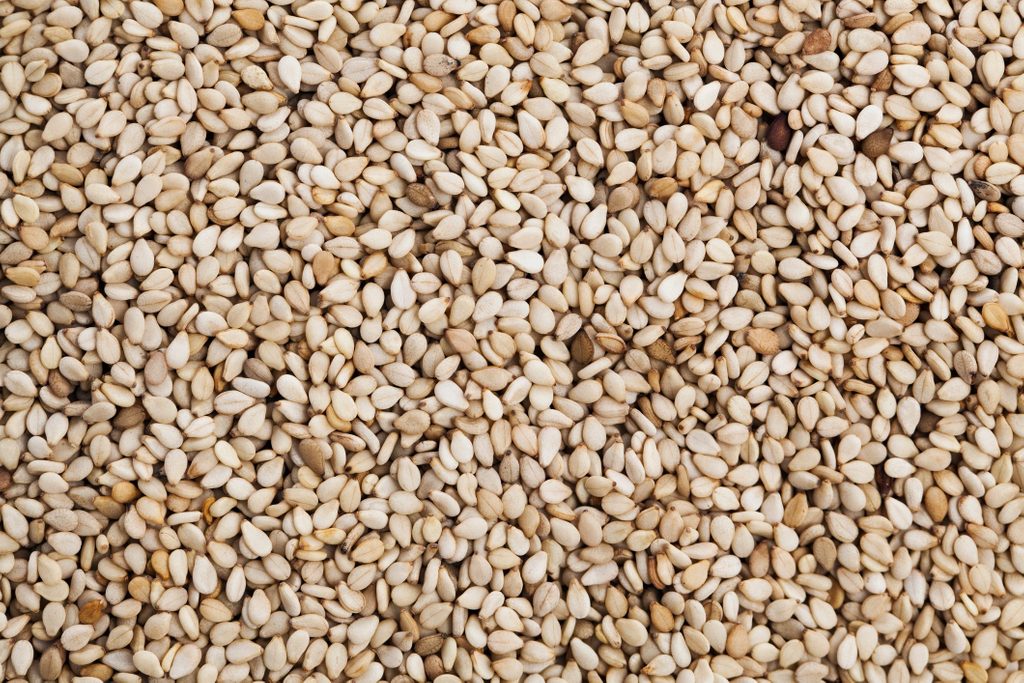Should You Eat Sesame Seeds? Here Are the Benefits, Nutrition, and How to Eat Them

These seeds are small but loaded with fibre, healthy fat, and protein. Here are the benefits of sesame seeds, plus the best way to eat them.
If you’re looking for a food with health benefits that may also help with weight loss, you may want to consider adding sesame seeds to your diet.
These small seeds, similar to poppy seeds, pack a lot of fibre, healthy fat, and protein. And they have many other nutrients like calcium and magnesium, as well as natural antioxidants, which have multiple health benefits.
Here’s everything you need to know about these small, but nutrient-rich seeds, including their health benefits, risks, and the best way to eat them.
What are sesame seeds and where do they come from?
Sesame seeds are the edible seeds that grow in pods on a plant called Sesamum indicum, says Cynthia Sass, a plant-based diet specialist based in Los Angeles.
“Sesame seeds can be consumed raw, toasted, or ground into things like tahini,” explains Sass. “Sesame oil extracted from the seeds has a higher smoke point, between 350 and 450 degrees depending on whether it’s refined or unrefined, making it a good option for cooking.”
India and China are the largest producers of sesame seeds. The seeds came to the United States in the 1930s, but because of harvesting difficulties, the seeds are primarily imported. There are two types of sesame seeds: shattering varieties, which are for consuming; and nonshattering varieties, which are used solely for sesame oil production.
Whether you sprinkle them onto dishes or mash them into a paste, “the small seed can be enjoyed in many ways,” says Lauren Manaker, a registered dietitian nutritionist in Charleston, South Carolina.
(Related: Should You Be Eating Flaxseeds? The Health Benefits, Risks, and Nutrition)
Nutrition facts
Sesame seeds are an extremely nutritious seed, loaded with healthy fat, fibre, protein, and calcium. According to the USDA, one tablespoon of sesame seeds contains the following nutrients:
- Fat: 14 g
- Sodium: 3 mg
- Carbohydrates: 7 g
- Fibre: 3.3 g
- Sugar: 0.1 g
- Protein: 5 g
- Calcium: 276 mg
- Iron: 4 mg
- Potassium: 133 mg
- Magnesium: 100 mg
- Manganese: 0.7 mg
- Zinc: 2 mg
Health benefits of sesame seeds
Sesame seeds have been used in diets and medicine for years because of their many health benefits.
“They contain natural antioxidants, and because of this they can help combat oxidative stress and possibly reduce the risk of cardiovascular disease,” says Manaker.
The seeds also have a good amount of both calcium and magnesium, which can help lower blood pressure, according to a study published in 2018 in Advances in Chronic Kidney Disease.
What’s more, they’re rich in polyunsaturated and monounsaturated fats, which may help improve cholesterol levels when used in place of saturated fat, according to the American Heart Association. And they contain the plant compounds lignans and phytosterols, which may also help to lower cholesterol levels, suggests a study published in the International Journal of Food Sciences and Nutrition.
And according to a review of studies in The Journal of Steroid Biochemistry and Molecular Biology, the phytosterols may also help counteract menopause symptoms like hot flashes.
(Related: Can Black Seed Oil Help with Weight Loss?)
Sesame seeds and weight loss
Because of their high fibre, protein, and healthy fat content, sesame seeds can help fill you up, as well as keep you satiated longer, which can aid in weight loss. And since they have only a few carbs, they also support blood sugar control.
“Including foods that contain healthy fats, protein, and fibre can help you feel full longer and therefore may assist with weight loss goals,” says Manaker. “Since sesame seeds naturally contain all three, they’re the perfect addition to salads, soups, and other dishes if weight loss is the goal, as long as proper portion sizes are being monitored.”
Risks and side effects of sesame seeds
While sesame seeds have numerous health benefits, there are a few risks factors you should be aware of. If you have a seed allergy, it’s best to avoid eating the seeds or using sesame oil.
Also, since sesame seeds may have a potential effect on blood pressure, those with low blood pressure should consult a doctor to determine if consumption is okay.
Best way to eat sesame seeds
It’s easy to incorporate sesame seeds into your diet. Sass recommends adding them to salads, sprinkling them onto cooked veggies, or throwing some into a stir fry or slaw.
“Tahini can be seasoned and used as a salad dressing, or drizzled over cooked potatoes or vegetables, or used as a dip for raw veggies,” she says. “Unseasoned tahini can be blended into smoothies, or used in energy balls with cocoa powder and other add-ins.”
Try making these delicious energy balls with this recipe from Sass that features the super sesame seed.
(Also Try: Grilled Sesame-Tofu Salad)
Cocoa Tahini Balls
Makes 8 balls
Ingredients:
- 2 tbsp. tahini (ground sesame seeds)
- 1 tbsp. pure maple syrup
- 2 tbsp. cocoa powder
- 2 tbsp. almond flour
- 1/4 tsp. fresh grated ginger root
- 1/4 tsp. ground cinnamon
Directions:
Combine all ingredients in a small bowl to create a uniform mixture. Pinch off small spoonfuls, and then use your palms to roll into round balls. Enjoy the balls as is, or roll in sesame seeds.
Next: Mushroom Jerky and 7 Other Healthy Alternatives Nutritionists Love




